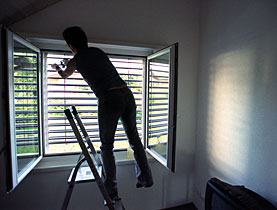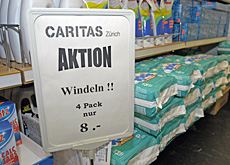Swiss try to clean up domestic worker wages

Domestic workers in Switzerland, near the bottom of the pay ladder and without minimum wage protection, are likely to be squeezed hardest as recession sets in.
The federal authorities have addressed the issue and recently announced plans for a standard work contract for household employees including a minimum wage, similar to an initiative in canton Geneva.
Although exact numbers are hard to come by, the Geneva-based Interprofessional Workers’ Union, a workers’ rights association, says there are 50,000 unregistered domestic employees in Switzerland.
According to the organisation, of a total of 7,000 – mostly women – who work in canton Geneva, some 5,000 either live in Switzerland illegally or do not pay taxes.
A report on global wages published last week by the International Labour Organization (ILO) highlighted the fact that Switzerland, alongside countries including Bangladesh, Saudi Arabia, Japan, Jordan, Peru and Thailand, did not have a minimum wage safety net for its domestic workers.
The exception is canton Geneva, where a standard contract sets out a minimum monthly salary of SFr3,430 ($2,860).
Hardest hit
Domestic employees, like other low-paid workers, will be hardest hit by the coming recession and decreasing rates of pay, ILO expert Manuela Tomei told swissinfo.
“The middle classes tend to be hit badly and before that happens there is a period where the salaries of domestic workers are penalised first,” she said.
Apart from canton Geneva, Swiss regulations governing pay conditions for domestic workers are piecemeal and the spectrum of salaries can range from SFr10 to SFr35 per hour, depending on the region and legal status.
Guidelines exist in certain cantons, like Vaud, which recommends SFr17 per hour, or canton Basel, which suggests SFr20-30 per hour.
“But guidelines are just guidelines and they don’t have to be adhered to,” Daniel Lampert of the Swiss Trade Union Federation told the Tages-Anzeiger newspaper.
Canton Zurich seems to pay the best, with rates from SFr25 to SFr35 per hour net.
“Serious and dramatic”
While the plight of Geneva’s domestic employees can be “difficult” and “precarious”, in the rest of Switzerland, domestic workers face a “serious and dramatic” situation, said Giangiorgio Gargantini, specialist on domestic workers at the Interprofessional Workers’ Union.
“When someone is paid by the hour, salaries tend to be respected; but if they are full-time the salary is respected only 50 per cent of the time,” he told swissinfo.
They have no legal rights and the situation is often dramatic for a person without a work permit for whom the problems can mount up, he added.
With this in mind, the Federal Tripartite Commission recently announced plans next spring to present to the government a standard work contract for domestic employees, including a minimum wage.
The State Secretariat for Economic Affairs (Seco) had earlier commissioned a study carried out by Geneva University, which confirmed that domestic workers generally earned much less than those in comparable occupations. And indirect pressures tended to drive down wages.
“We noticed that in many cases, almost a quarter of salaries were lower than the minimum acceptable limits,” said Serge Gaillard, head of Seco’s labour division.
No organisation
While the amount has still to be fixed and agreed upon, the basic arguments in favour of a minimum salary for all domestic workers in Switzerland are clear, he said.
“They don’t have an organisation, such as a union, to defend them. And domestic work is an activity that is developing and we want to make sure that the salaries are correct,” said Gallaird.
“Plus we don’t want to start recruiting lots of people from emigration countries for low salaries who come here and live precariously.”
The commission is hoping the extension of the labour treaty to the latest European Union member states, Bulgaria and Romania, which will be decided in a nationwide referendum scheduled for next February, will not result in lower salaries and unacceptable working conditions.
“The introduction of a minimum salary at least gives people in Switzerland, even illegally, certain rights, including the right to demand the payment of minimum salaries. And those who pay lower salaries run the risk of having to pay the difference at a certain moment,” said Gaillard.
“This is a positive step and recognition of the need to address this issue,” said Tomei.
swissinfo, Simon Bradley
One in eight employees in Switzerland has a salary considered to be low, according to the Federal Statistics Office.
These jobs concern 320,000 people – 70 per cent of them women – who earn less than SFr3,783 ($3,628) per month for a 40-hour work week.
Over the past decade, the percentage of low salaries among the workforce has only varied slightly, decreasing from 11.2 per cent to 10.2 per cent. These wages are often paid in the hotel and retail industries, and in six out of ten firms with fewer than 50 employees.
Nearly half of those on low salaries work fulltime – 80 per cent of them women. Foreigners are also more likely to be among the lowest paid workers.
Only one in 22 people – less than four per cent of the working population – is considered to belong to the working poor category, which takes into account household income. More than 80 per cent of low-salary earners have another source of revenue to supplement their wages, such as working partners.
According to a 2005 confidential report by the Federal Migration Office there are 130,000 illegal workers in Switzerland.
More than 7,000 live in the canton of Geneva, 10,000 in Vaud and almost 7,000 in Basel. More than 20,000 live in canton Zurich.

In compliance with the JTI standards
More: SWI swissinfo.ch certified by the Journalism Trust Initiative











You can find an overview of ongoing debates with our journalists here . Please join us!
If you want to start a conversation about a topic raised in this article or want to report factual errors, email us at english@swissinfo.ch.